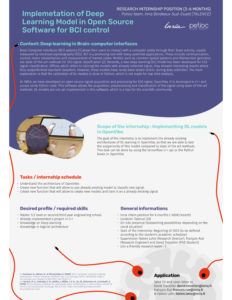
17 Apr Research Internship Position: Implementing DL Models in OpenVibe
Implementation of Deep Learning Model in Open Source Software for BCI Control
RESEARCH INTERNSHIP POSITION (3 – 6 MONTHS)
Potioc team, Inria Bordeaux Sud-Ouest (TALENCE)
Context: Deep learning in Brain-computer interfaces
Brain Computer Interfaces (BCI) systems [1] allow their users to interact with a computer solely through their brain activity, usually measured by electroencephalography (EEG) BCI is a promising tool with many potential applications. These include communication control, motor rehabilitation and measurement of mental states. Models such as common spatial patterns and Riemannian geometry are state-of-the-art methods for EEG signal classification [2]. Recently, a new deep learning (DL) model has been developed for EEG signal classification. Offline, which refers to training the models with already collected signal, they showed interesting results where explanation is that the calibration of DL models is done in Python, which is not made for real time analysis.
At INRIA, we have developed an open source signal acquisition and processing for EEG signal, OpenVibe. It is developed in C++ and accept some Python code. This software allows the acquisition, preprocessing and classification of the signal using state-of-the-art methods. DL models are not yet implemented in this software, which is a loss for the scientific community.
Scope of the internship: Implementing DL models in OpenVibe
The goal of the internship is to implement the already existing architectures of DL learning in OpenVibe, so that we are able to test the superiority of this model compared to state of the art methods. This task can be done by using the tensorflow C++ api or the Python boxes in OpenVibe.
Tasks/ internship schedule
- Understand the architecture of OpenVibe.
- Create new function that will allow to use already existing model to classify new signal.
- Create new function that will allow to create new models and train it on a already existing signal
Desired profile/ required skills
- Master 1/2 level or second/third year engineering school.
- Already implemented a project in C++
- Knowledge on Deep learning
- Knowledge in logiciel architecture
General informations
- lnria intern position for 6 months (-600€/month)
- Location: Talence (33)
- On-site presence (teleworking possibilities depending on the covid situation)
- Start of the internship: Beginning of 2023 (to be defined according to the student’s academic schedule)
- Supervision: Fabien Lotte (Research Director), François Rue (Research Engineer) and David Trocellier (PhD Student)
- Join a friendly research team! 🙂
Application
Send CV and cover letter to
David Trocellier david.trocellier@inria.fr
François Rue francois.rue@inria.fr
& Fabien Lotte fabien.lotte@inria.fr
[1 Graimann, B., Allison, B., & Pfurtscheller, G. (2009) Brain-computer interfaces: A gentle introductIon. In Brain-computer interfaces (pp. 1-27). Springer, Berlin. Heidelberg. https://link.springer.com/chapter/10.1007/978-3-642-02091-9_1
(2) Cervera, M.A., Soekadar, S. R., Ushiba, J., Millan, J. D. R., Liu, M., Birbaumer, N., & Garipelli, G. (2018) Brain-computer interfaces for post-stroke motor rehabilitation: a meta-analysis. Annals of clinical and translational neurology, 5(5), 651-663. https://onlinelibrary.wiley.com/doi/full/10.1002/acn3.544



Sorry, the comment form is closed at this time.